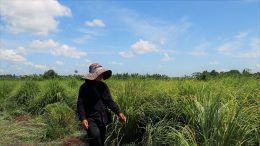
Kampong Cham, Cambodia – One hundred fifty kilometers from Phnom Penh is the village of Sambo Village Sambo Village in Sopheas Commune, Steung Trong District, Cambodia. Most of the villagers grow paddy and cassava for a living. Additionally, they also grow a few bushes of lemongrass for family consumption.
Seeing the growth of the collaborative work of agricultural cooperatives in other areas, a group of farmers in the village initiated the establishment of an agricultural cooperative. Sambo Meanchey Agricultural Cooperative was officially registered on 10 December 2010 with an initial membership of 88 of which 45 are female. They have a total of 117 shares with a par value of KHR 50,000 (Cambodian riels) (USD 12) per share or KHR 5,850,000 (USD 1,415) in total. In recent years, the cooperative has seen an increase in membership and shares. Currently, the cooperative has 364 members of whom 224 are female and a total capital of KHR 1,177,000,000 (USD 284,655).
The objectives of the establishment of the Sambo Meanchey Agricultural Cooperative are to (1) solve issues of farmers and find a market for their agricultural produce; (2) collect member products for supplying to the market; (3) negotiate agricultural product prices with merchants; (4) provide agricultural loans to members, and; (5) offer technical skills and the flow of the latest information to members.
The cooperative receives support from other organizations to strengthen the capacity of the cooperative committee including support from GSTD in providing paddy seeds production techniques and building paddy storehouses for storing paddy seedlings. A food production project aids the construction of paddy seedlings storehouse. The community is also supported by the Cambodian Farmers Association Federation of Agricultural Producers (CFAP) through the AFOSP-MTCP2 Programme.

Coop explores lemongrass production
For the past few years, there had been a high market demand for lemongrass in Cambodia and the crop has proved to be profitable. Further, it is an easy crop to tender compared with other crops.
Chheng Thong, Chairperson of the Board of Sambo Meanchey Agricultural Cooperative, started the analysis on the lemongrass growing market to see how many tons of lemongrass a hectare of land can produce and how much it can be sold for. They contacted a wholesale lemongrass market in Phnom Penh to learn how many tons they need and how much is the price.
“The majority of the lemongrass currently sold in the market is imported from Vietnam. Our cooperative has plenty of vacant arable land. I think that if we can find a big lemongrass market, we can help leverage our members to another level,” he says.
Eventually, many of the Sambo Meanchey Agricultural Cooperative members shifted to growing lemongrass instead of paddy and cassava.
Heng Nang, a member of the cooperative says, “Through reinforcement of lemongrass growing, I can earn more income compared to paddy cultivation. I can have a yield of over 20 tons and the price per one kilogram is KHR 800 to 1,000 (USD .19 – .24), while the paddy per hectare can only yield 5 to 6 tons and the price is KHR 1,200 to 1,400 (USD .29 – .34) per kilogram.”
In 2018, the cooperative sold 300 to 400 tons of lemongrass to Deum Kor Market and Neak Meas Market.
“Nowadays, though our community can sell over 1,000 tons per year, it remains below the market demand! Overseas markets are also contacting us for supply chain, but we lack production capacity,” Chairperson Chheng says.

The cooperative does a marketing strategy of servicing only and avoid buying products directly from its members. Per kilogram of lemongrass, the cooperative charges KHR 30 (USD 0.0073) and keeps it in the cooperative. The transportation of produce is recorded by those who bring the products for distribution to the markets. The cooperative has been increasing the productivity of lemongrass production as well as choosing quality seedlings that cater to market demands to be able to compete with lemongrass that is imported from Vietnam.
From the experience of the Sambo Meanchey Agricultural Cooperative, establishing an agricultural community makes it easier to find markets and negotiate the price. The community committee always provides market updates to the members by holding regular meetings where they disseminate information to members so that they can understand the importance of producing quality lemongrass and its packaging for the market. Moreover, the cooperative is researching and looking for the possibility of processing the lemongrass upper leaves which are usually discarded. #
About AFOSP-MTCP2
AFOSP-MTCP2 is a capacity building program funded by the European Union (EU) with co-financing from the International Fund for Agricultural Development (IFAD) and the Swiss Agency for Development and Cooperation (SDC). The program is being implemented in seven ASEAN countries through the consortium Asian Farmers’ Association for Sustainable Rural Development (AFA) and La Via Campesina (LVC). AFOSP-MTCP2 supports the strengthening of national farmers’ organizations (FOs) and their national platform towards improving their institutional capacity to deliver economic services to their members as well as to effectively engage them in policy processes. At the ASEAN level, the consortium AFA – LVC works in partnership with the ASEAN Foundation in expanding the spaces for the engagement of FOs in ASEAN processes.

Comments are closed